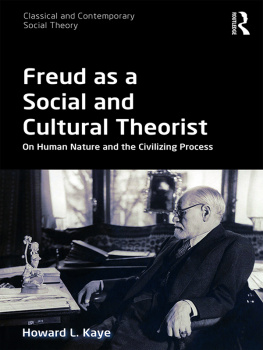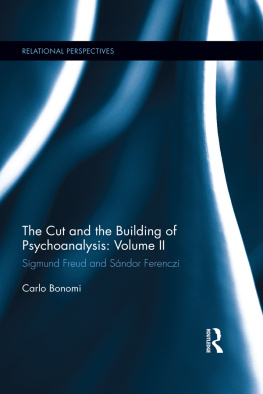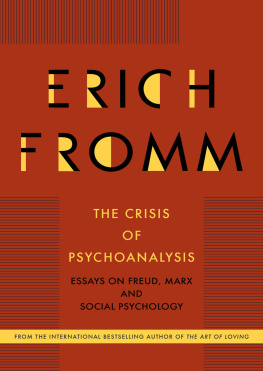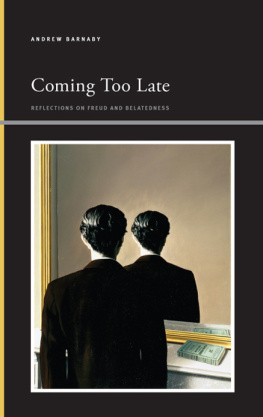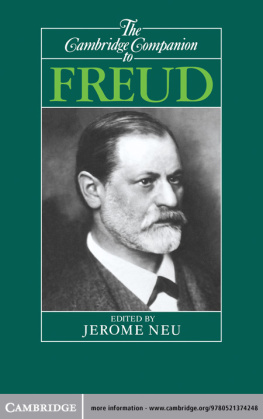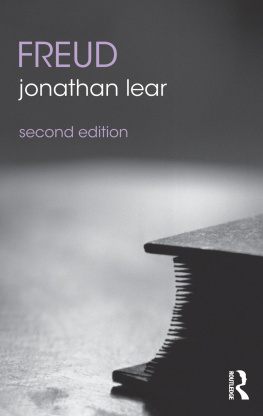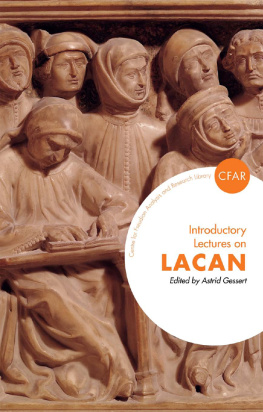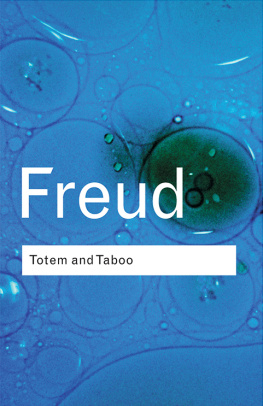Freud as a Social and Cultural Theorist
This book offers a new account of Freuds work by reading him as the social theorist and philosopher he always aspired to be, and not as the medical scientist he publicly claimed to be. In doing so, the author demonstrates that Freuds social, moral, and cultural thought constitutes the core of his lifes work as a theorist, and is the thread that binds his voluminous writings together: from his earliest essays on the neuroses, to his foundational writings on dreams and sexuality, and to his far-ranging reflections on art, religion, and the dynamics of culture. Returning to the fundamental questions and concerns that animate Freuds workthe nature of evil; the origins of religion, morality, and tradition; and the looming threat of resurgent barbarismFreud as a Social and Cultural Theorist provides the first systematic re-examination of Freuds social and cultural thought in more than a generation. As such, it will be of interest to social and cultural theorists, social philosophers, intellectual and cultural historians, and those with interests in psychoanalysis and its origins.
Howard L. Kaye is Emeritus Professor of Sociology at Franklin and Marshall College, USA, and the author of The Social Meaning of Modern Biology.
Classical and Contemporary Social Theory
Classical and Contemporary Social Theory publishes rigorous scholarly work that re-discovers the relevance of social theory for contemporary times, demonstrating the enduring importance of theory for modern social issues. The series covers social theory in a broad sense, inviting contributions on both classical and modern theory, thus encompassing sociology, without being confined to a single discipline. As such, work from across the social sciences is welcome, provided that volumes address the social context of particular issues, subjects, or figures and offer new understandings of social reality and the contribution of a theorist or school to our understanding of it.
The series considers significant new appraisals of established thinkers or schools, comparative works or contributions that discuss a particular social issue or phenomenon in relation to the work of specific theorists or theoretical approaches. Contributions are welcome that assess broad strands of thought within certain schools or across the work of a number of thinkers, but always with an eye toward contributing to contemporary understandings of social issues and contexts.
Series Editors: Stjepan G. Mestrovic, Texas A&M University, USA
Lost in Perfection
Impacts of Optimisation on Culture and Psyche
Edited by Vera King, Benigna Gerisch and Hartmut Rosa
Critical Theory and the Classical World
Martyn Hudson
Emotions, Everyday Life and Sociology
Edited by Michael Hviid Jacobsen
Urban Walls
Political and Cultural Meanings of Vertical Structures and Surfaces
Edited by Andrea Mubi Brighenti and Mattias Krrholm
Updating Charles H. Cooley
Contemporary Perspectives on a Sociological Classic
Natalia Ruiz-Junco and Baptiste Brossard
For more information about this series, please visit: https://www.routledge.com/sociology/series/ASHSER1383
First published 2019
by Routledge
2 Park Square, Milton Park, Abingdon, Oxon OX14 4RN
and by Routledge
52 Vanderbilt Avenue, New York, NY 10017
Routledge is an imprint of the Taylor & Francis Group, an informa business
2019 Howard L. Kaye
The right of Howard L. Kaye to be identified as author of this work has been asserted by him in accordance with sections 77 and 78 of the Copyright, Designs and Patents Act 1988.
All rights reserved. No part of this book may be reprinted or reproduced or utilised in any form or by any electronic, mechanical, or other means, now known or hereafter invented, including photocopying and recording, or in any information storage or retrieval system, without permission in writing from the publishers.
Trademark notice: Product or corporate names may be trademarks or registered trademarks, and are used only for identification and explanation without intent to infringe.
British Library Cataloguing-in-Publication Data
A catalogue record for this book is available from the British Library
Library of Congress Cataloging-in-Publication Data
A catalog record has been requested for this book
ISBN: 978-1-138-36315-1 (hbk)
ISBN: 978-0-429-43175-3 (ebk)
I have told you that psycho-analysis began as a method of treatment; but I did not want to commend it to your interest as a method of treatment but on account of the truths it contains, on account of the information it gives us about what concerns human beings most of alltheir own natureand on account of the connections it discloses between the most different of their activities.
(Freud 1933a, SE22: 156157)
Who now reads Freud? A generation ago, it was not uncommon to consider Freud, alongside Marx, Durkheim, and Weber as one of the great founding sociologists and social theorists and one of the most enduring recognized sources of modern sociology (Lemert 1993, 9; 1995, xi); but those days are gone. Even before the Freud-bashing of recent decades had seriously eroded Freuds status in the culture at large, the frequent misreadings and simplisms of his social scientific interpreters had rendered his work largely superfluous within the human sciences (). Like Herbert Spencer before him, Freud has fallen from the ranks of essential social theorists and seems to live on today primarily as a figure for ritual dismissal, thereby fostering the comforting illusion of theoretical and scientific progress in the study of human nature and its cultural expressions.
In opposition to such a view, this book endeavors to make Freuds work stimulating and accessible to sociologists and social theorists once again, by reading him not as the medical scientist he publicly claimed to be, but as the social philosopher he always aspired to be. To present himself to the public as a medical scientist was certainly of vital importance to Freudand to his followersin the hope of legitimizing his therapeutic and theoretical claims. But of greater significance, cloaking his thought in the mantle of science was an essential means of lending authority to Freuds social philosophy and cultural critique.
In moments of candor, however, and scattered throughout his long life, Freud acknowledged that he was not really a proper scientist or physician. From his earliest youth onwards, as his letters to Eduard Silberstein, Martha Bernays, and Wilhelm Fliess make clear (FSil, 70, 95, 97, 109; J, III: 41; FFl, 159, 180, 398), Freuds primary interest lay in the riddles of our nature and cultural existence (Freud 1925d, SE20: 8; 1927a, SE20: 253). What he called ).
When seen from the perspective of Freuds intellectual development and abiding interests, his widely scattered writings on art, religion, morality, and the dynamics of culture appear not as the self-indulgent, if occasionally illuminating, forays of an overly ambitious physician and one-time brain anatomist straying far outside his area of expertise, but as the core and culmination of his lifes work as a philosopher and social theorist. The real intention of Freuds work, as Paul Ricoeur (1974, 121122) properly noted, is to offer an interpretation of culture that could lead to its alteration, and to the alteration of ourselves within it. Yet the various elements that together constitute Freuds social thought and interpretation of culture are not to be found solely in his overtly cultural texts, such as

